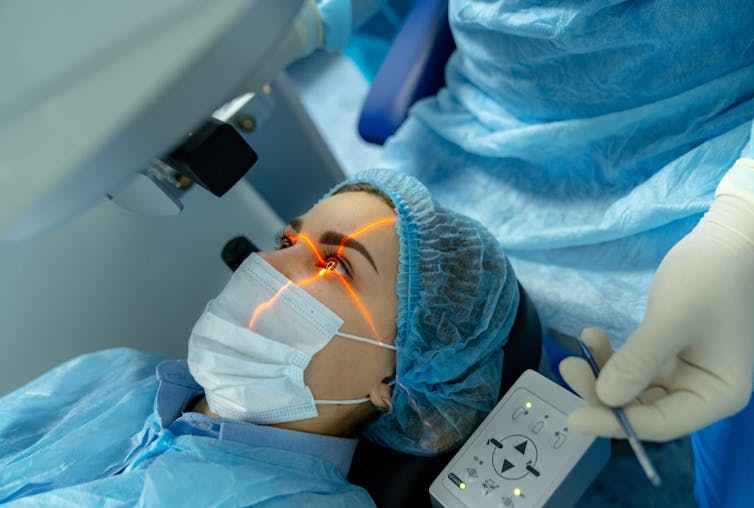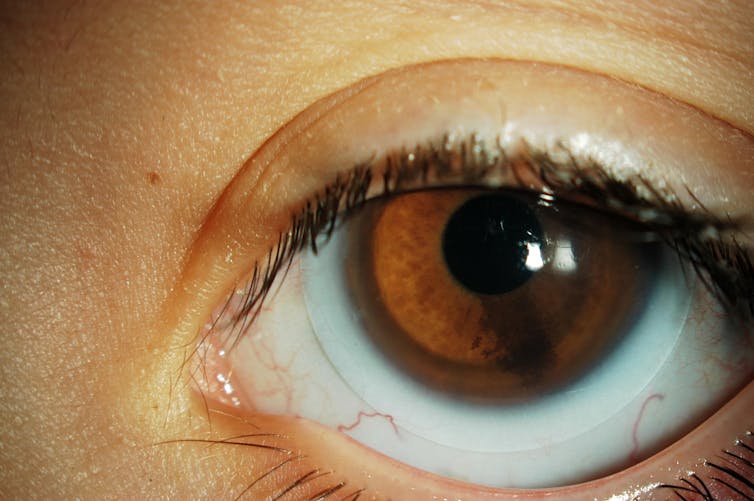
Langis Michaud, Université de Montréal
Judy is an accomplished consultant who regularly travels for business meetings. She came to see me because she was finding her contact lenses uncomfortable and wanted to explore other options — notably surgical alternatives.
One option was to replace her lens with an implant. This surgery is similar to cataract surgery, but offered to patients who do not have this condition. However, it is not without risks.
As an optometrist with expertise in contact lenses, dry eye treatment and pre- and post-operative management of eye surgery, I had the experience required to help Judy.
Dry eyes
I started by doing a clinical assessment of Judy. When she came to see me, she was about to turn 53, had myopia (can’t see far), astigmatism (images stretched far and near) and presbyopia (can’t see near) caused by age.
She hated glasses and didn’t want to wear them in front of her customers, which is why she had undergone laser surgery to correct her myopia 15 years earlier.
At age 45, when presbyopia appeared, Judy had to be refitted with contact lenses. Around the time of menopause, at age 51, she developed some symptoms of dry eyes, which had increased in the months before she came to see me.
Changes in lens materials, care solutions or wearing mode (one day) had little effect. The arid environments (car interiors, airplanes, recycled office air) to which she was regularly exposed contributed to her symptoms. She also spent quite a number of hours in front of a computer screen, and as a result, blinked less frequently, which in turn increased her visual discomfort.
Clinical examination showed that she did, indeed, suffer from dry eyes. She had a reduced volume of tears, a side effect of her laser surgery. Her cornea showed a dry, altered area, which we attributed to incomplete closure of the eyelids during sleep, no doubt induced by the cosmetic eyelid surgery she had had three years prior. And then there were the consequences of her medication: some antidepressants have drying effects on the eye.
A step-by-step approach
Judy’s vision problems were compounded by eye health issues.
All dry eyes have an impact on quality of vision, whatever the method of correction that’s used. So the first thing to do was to restore the balance — and treat her dry eyes.
Past surgery had left its mark, and there is no turning back the clock. So how to proceed in this situation?
As far as the eyes are concerned, the first step is to ensure intensive lubrication (full artificial tears, with no chemical preservatives). An ointment should also be applied at bedtime to protect the cornea during sleep. Topical cyclosporine should be considered because of its action on tear stability.
Furthermore, soft contact lenses can exacerbate dry eyes. Fortunately, other alternatives exist. Scleral lenses are large rigid lenses that create a tear reservoir, which helps to reduce dry eye symptoms. Despite their large diameter, these lenses are very comfortable because they rest on the white of the eye (the sclera) without touching the cornea. Visually, they can compensate for myopia, astigmatism and presbyopia.
I suggested these lenses to Judy. However, from her reaction I understood that she was looking for a surgical alternative instead.

Lens exchange, with clear crystalline lenses as an option
Laser enhancement is not an option when the cornea becomes too thin.
However, for some years now, it has been possible to have surgery to replace the crystalline lens, the natural lens inside of the eye, with an implant. Similar to cataract surgery, this procedure is carried out in the absence of any pathology of this type, on patients who are generally younger (aged 50-65) and healthy. And it is currently quite popular.
The advantage is that this implant can correct the majority of visual defects — unlike Lasik. In Judy’s case, it would be a multifocal (distance and near vision) and toric (astigmatism) lens implant.
Judy was immediately interested in this option. She assumed that this surgery would permanently free her from the need for contact lenses or glasses.
A procedure with potential risks
All surgery carries risks. In the presence of disease or pathology, the ophthalmologist’s decision to operate should, in theory, be based on a rigorous assessment of the level of risk compared to expected benefits.
In the case of a clear lens exchange, where no pathology is present, the question of risks versus benefits must be considered differently. We are essentially talking about non-essential, non-urgent cosmetic surgery. The risk remains, but the benefit is less obvious and more related to the patient’s personal satisfaction, which may vary a lot based on our own perspective.
While cataract surgery is considered to be a safe procedure, the same cannot always be said of clear lens exchange. The younger the patient, the greater the risk of complications. Other factors specific to the patient may also weigh in the balance. Before proceeding, the condition must be rigorously assessed.
The retina of every myopic person is at risk of tearing. This is a possible complication of cataract and lens surgeries that should not be underestimated. The high myopic retina is also stretched and can deteriorate beyond the age of 60, like a cinema screen that becomes cracked. Vision automatically deteriorates.
A multifocal implant requires a perfect retina to ensure good vision. Since Judy was highly myopic, she cannot be guaranteed perfect vision for life following clear lens exchange.
Not to mention that, like her mother and grandmother, she could one day develop macular degeneration. In this case, as well, the vision of the multifocal implant would be greatly affected.
Multifocal implants are often associated with the perception of halos and glare, particularly in the evening. While the majority of patients tolerate these side effects after surgery, they can become very disturbing over the long term, as they persist over time. It may be worst in the presence of eye dryness. Moreover, the procedure is not entirely reversible — removal of the implants can have significant consequences.
So replacing Judy’s lens didn’t seem to be the best option, at least for the moment. In the meantime, she decided to consider scleral lenses and to optimize the treatment of her dry eyes.
She left satisfied, having explored her options with the person who knows her eyes best — her optometrist!![]()
Langis Michaud, Professeur Titulaire. École d'optométrie. Expertise en santé oculaire et usage des lentilles cornéennes spécialisées, Université de Montréal
This article is republished from The Conversation under a Creative Commons license. Read the original article.

